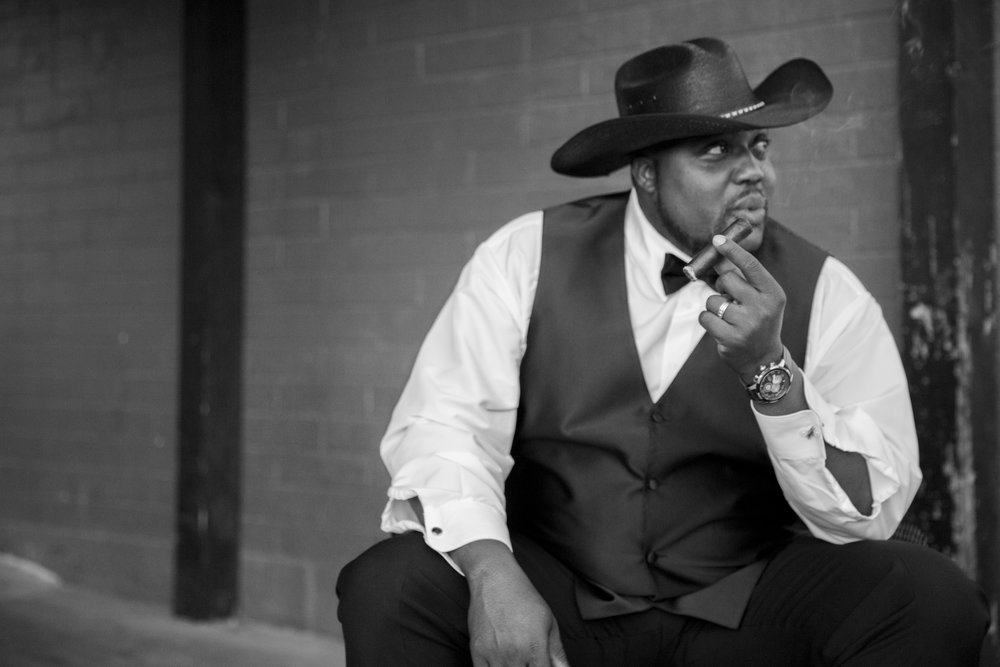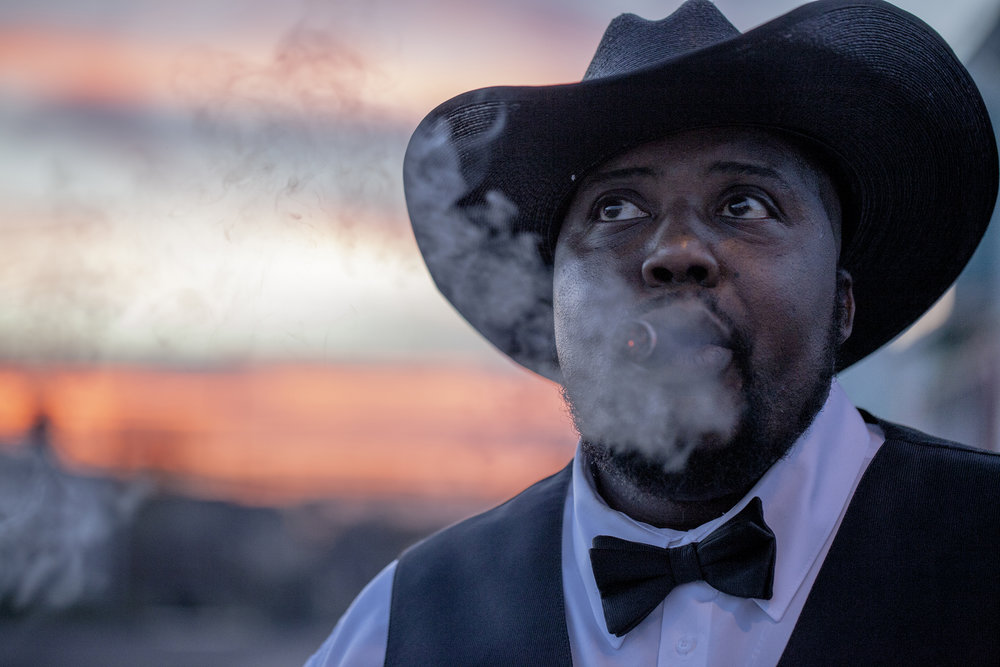
Sugaray Rayford wants you to know his shows aren’t for eating cheese and drinking wine. They are raucous experiences, a celebration of music, dancing and good times. He refuses to call his shows “concerts,” preferring to talk about them as parties. Semantics aside, it’s hard to deny that Rayford’s brand of soulful electric blues is anything but infectious. His church-honed vocals have unquestionable gospel influences, infusing his music with a certain sincerity that is increasingly harder to find. Rayford’s latest musical brainchild, The World That We Live In, marks his fourth album released and might just be his most intimate project yet.
Fresh off recording his first live album, we caught up with Rayford to talk about his influences, vulnerability when writing, and letting his music lead the way.
Marmoset: What drew you to music at such a young age?
Sugaray Rayford: I started in gospel in a church in east Texas. I first started singing in the choir when I was five and I started playing drums around seven, but yeah, I started pretty early.
Having said that, when did you know that you wanted to pursue music as a career?
Well, actually, it’s weird. I told this story so many times. I stopped playing music at about 16-17 and I didn’t play music for over 20-some-odd years. I didn’t touch the drums, keys, sing or anything. I went into the military, had a son, and it wasn’t until I met my current wife – she was the one who pushed me into doing music. That must have been around 2000.
You mentioned getting started in gospel, who are some of the artist that have influenced you?
I was really into choir music, like The Mississippi Mass Choir. I didn’t realize how fortunate I was back then to get to see and be on stage with people like The Jackson Southernaires, The Mighty Clouds of Joy, The Winans, people like that.
Can you talk a little bit more about your new album The World We Live In?
It was weird – the way it came about was weird. Lucas Sapeo, the owner of Blind Faith records, had seen me some years before in Lucerne, Switzerland with the Mannish Boys. They contacted my manager, who was my wife, a few years later while I was on tour and when I got home I thought I would finally get to be home for a while. She let me be home for a couple days before she sprung it on me and told me I had to go to Italy to record an album with Lucas Sapeo.
Before I knew it I was in Rome with people I didn’t know. We got to the studio and I realized it was a great analog studio. And, once I heard the songs, I was just like, “Okay, this is the sound I’ve been hearing in my head.” I couldn’t believe that someone else was able to read my mind. The whole process was a lot of fun because it allowed me to do a bunch of different things vocally.
What is your favorite part of the songwriting process?
Most of the time, my songs are about things that have happened years or sometimes even decades before. Almost everything I’ve ever written is about something that’s actually happened to me or about the thoughts that have actually been going through my mind. It’s overwhelmingly joyful when the thoughts come out and then are put to music. That process is just euphoric.
A lot of what is written about you mentions your live shows and the energy you bring to them. What do you try to bring to your shows, and what do you hope people will get out of them?
My biggest thing I always tell people – and I’m notorious for this – is that this is not a concert; it’s a party. My whole idea of music has always been that for the couple hours that I’m on stage, my job is to try to make you forget the problems that are outside the venue, whatever is going on in your life. And for two hours, I want to give you a reprieve of smiles, thoughts and feelings. I want you to leave there sweaty and having danced the entire time. If that happens I feel that I accomplished what I came there to do.
I don’t like concerts. It doesn’t matter if there are 300 people or 130,000. It should be a party; what you came for was to party. Not that I’m talking bad about jazz music, but this not a jazz concert. When I perform, it’s not one of those things where it’s time to eat cheese and drink wine. No, it’s time to put on your dancing shoes, come out here sweat, dance, have a good time, cut some jokes, tell some stories – it’s a party.

Was there ever a time during the songwriting process where something didn’t start off sounding huge but ended up changing and exceeding your expectations?
My bass player, Ralph Carter, who used to write for The Eddie Money Band, wrote the title track of my first album The Blind Alley. It wasn’t until years later when we were performing it that people really knew the words and were dancing to it. Also the song, “Live to Love Again,” off the Southside album – a lot of those songs were songs that I had already written with Ralph maybe three to four years before even my first solo album, but I was too afraid as an artist. Songs like “Call Off A Mission,” “Live to Love Again,” “Slow Motion.”
For Blind Alley, since it was my first solo album, I wasn’t confident enough to express my bare naked thoughts. I was so worried about what people would think or say about the lyrics and the subject matter. But by the time I had started writing the Southside album, I was very competent in who I was and what I was doing, and what I wanted to say. That’s the first album that’s all original and it has the songs written and played the way I wanted them to be played. I had this thought in my head that either you got it or you didn’t. That was amazing for me. It took years for me to wait for that process, to get to that point where this is my voice this is what I have to say. You either listen or don’t, that’s up to you.
It seems like you work with quite a few bands. You have your own band and you contribute to others as well. Having worked with so many people, what does successful collaboration look like to you?
Music is something that you love but it’s also hard work. It has to be something that I enjoy or someone that I admire, and I’m so humbled that they would want to do something with me. So earlier this year I did some back up for The Temptations’s new album. I feel very humbled that people would want my big mouth on their album. I don’t know what success means. As long as we’re happy with what we’ve turned out — and so far I’ve been very lucky that the things I’ve done I’ve been very happy with.
What is the best piece of advice you’ve ever been given?
As my grandmother would say, “life is short, so enjoy it as much as you can.” It’s really weird, because you have to get to a point in life where you realize you have to start listening to people and do the things that you really love and want to do. Because you only get one go-around, so the last thing I’d want is to be on my death bed saying, “I wish I would have…” or “I could have…” I want to say, “I remember that, that was fun.”
So life is short, enjoy it, that’s what it’s made for.
Last question here for you. You said you’re going to have some time at home, but musically what is coming up next for you?
Well, we recorded my first live album on this tour. When I get home, I will be putting that together to put out my first live album. I’m getting ready to start going into the studio at some point. Then start writing for the next album. I’ve been continually moving towards this stack soul sound — the sound has been in my head when I play my record with the band.
I’m not going in it with any expectations. I’m still gonna write stories that are true to me so that when I’m singing them I can give the right feeling and people realize it’s not just words, it’s actual true stories put to music. I’m just gonna let the music dictate what the next step is.
